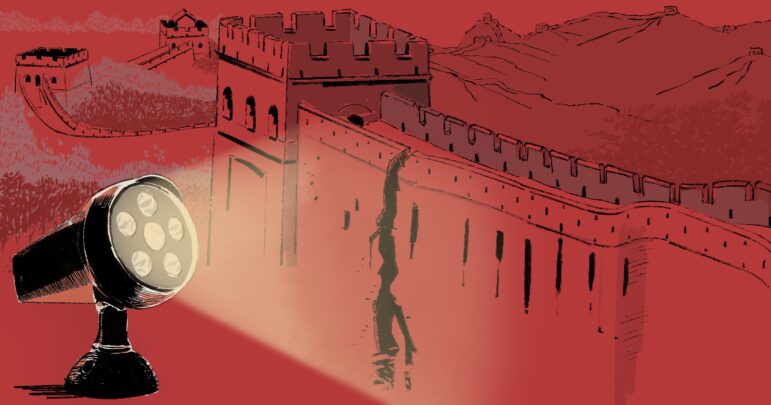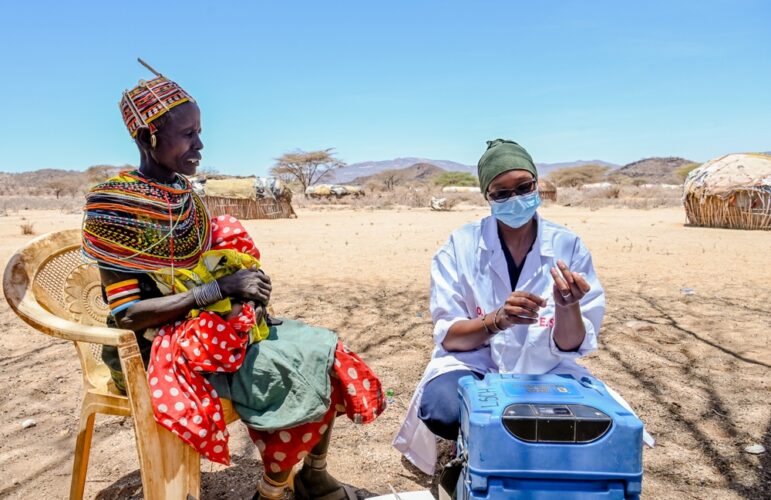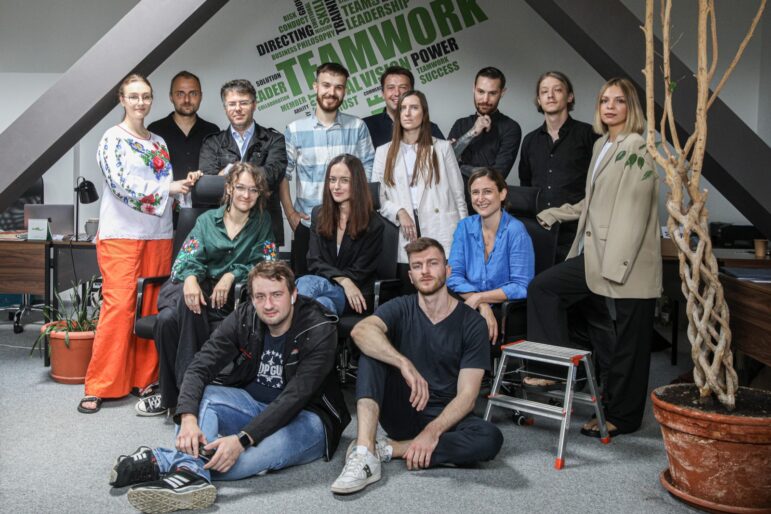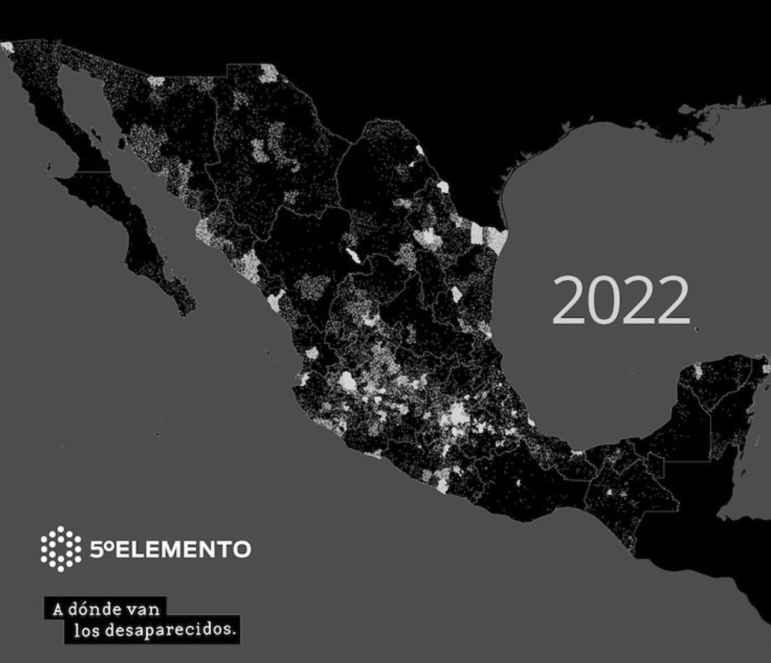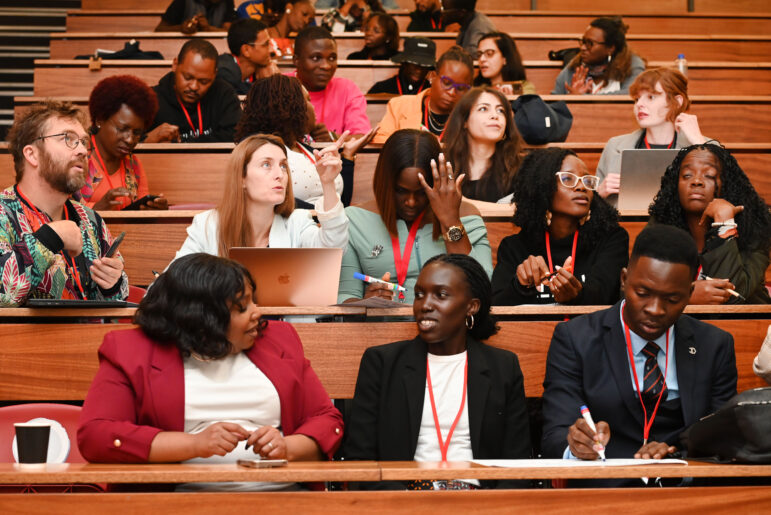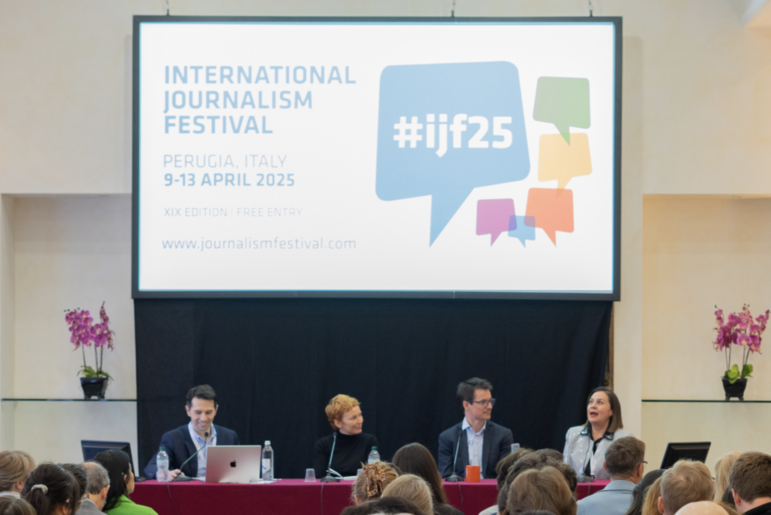
The IJF25 panel on Journalists as Founders, which featured moderator Djordje Padejski (far left), and founder-journalists Pavla Holcova (left), Martin Kotynek (right), and Martiza Felix (far right).
Journalists as Founders — Intrepid Pioneers or Reluctant Managers?
Read this article in
Whether it’s feeling disenchanted with the media landscape, a sense that there is an underserved audience, or just a simple belief that there are better ways to do business, there are myriad of reasons why reporters decide to set up their own news outlets.
But these enterprising journalists sometimes face a dilemma at the heart of this career transition: many of them would prefer to still be reporting or editing, rather than running a newsroom.
“I don’t want to do it!” joked Pavla Holcová, an investigative journalist and the founder of investigace.cz, an outlet in the Czech Republic, as she explained the dilemma during a panel at the 2025 International Journalism Festival. “Since I started, I’ve been looking for someone else to be the director, 11 years later — I didn’t find anyone.”
She laughed as she recounted this struggle, but both Holcová and her fellow panellists in Perugia, Italy, agreed that many people become founders because they are journalists with a vision, but then find that becoming a founder, and then a manager, requires a completely different skill set.
“I was just a journalist. I was so happy!” recounted Maritza L. Félix, the founder of Conecta Arizona, a Spanish-language news service based in the southern United States that connects people through WhatsApp and social media.
Martin Kotynek, who launched the Media Forward Fund, which finances media diversity in Germany, Austria, and Switzerland, told the audience that while he’s “not an active journalist right now, I still consider myself as a journalist.”
But he was gently brought to task by the moderator of the panel, Djordje Padejski, associate director of JSK Journalism Fellowships at Stanford University, who said he too “ended up being a founder and creator” when all he wanted to do was good journalism.
“I’m sorry to break it to you, you’re not a journalist anymore,” Padejski told Kotynek. “You’re a founder, you’re a fundraiser, a strategist, a brand maker, a marketer, a web developer.”
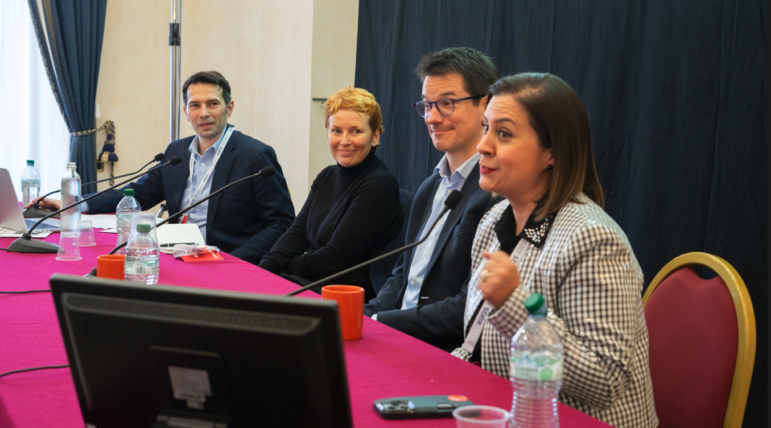
Martiza Felix (far right), founder of Conecta Arizona, a US-based Spanish-language news service, discusses the transition from newsroom employee to manager. Image: Andrea Marchi, for IJF25
Assemble Your Team — Not Just Journalists
Within that context, the panelists agreed that journalist founders need to train up, and quickly, hire key positions as soon as they can, and in the meantime, juggle multiple jobs at the same time.
“I still haven’t decided if it’s the best or worst idea of my life,” said Holcová. “If you need to balance so many balls, there are so many in the air you always drop two or three.”
Kotynek said the transition is hard for reporters who once worked in large, well-staffed newsrooms or for established media organizations.
“If you are in a big newsroom you have the capacity. If something comes up you have a team that can look into that — five people. A startup like us, it’s much harder to react to what’s coming up, to plan,” he explained.
This capacity gap also strikes when it comes to organizational administration. “If someone joins the team [at a big newsroom] someone will give them a computer, email address, and register them at the tax authorities. I took that for granted,” Kotynek added. “Seeing how small organizations have to deal with all of this burden, admin stuff, I don’t take it for granted anymore… Someone has to do it. And it’s mostly the founder.”
Be Ready to Fund Your Future
Félix said journalist founders also have to learn to talk the talk, and that she has had to learn an entire new language — funder language. “Instead of ‘I want a team to do my thing.’ It’s ‘I need to build capacity,’ it’s sexier isn’t it?”
As well as speaking in editorial terms about how she is changing the narrative at the border, Félix has learned to also phrase her ambitions in resource-terms, by setting out a narrative budget, a real budget, and a dream budget.
Her organization, which she started during the COVID-19 pandemic was not financially sustainable for three-and-a-half years, she told the conference. She gave herself a last pot of investment — tapping her kids’ future college money — and a deadline to try and turn the organization around. She spoke to everyone she could about community engagement, to “try and put a face on the stories, the project” — and it worked.
Partly, she said, she was driven by “realizing how important it is to tell our stories, to see myself, my kids reflected” in stories from the US-Mexico border. After the first door opened, more followed, and she says Conecta Arizona is now a financially healthy organization, with funding secured for the next three years.
“I don’t write stories any more, but I’m very good at asking people for money now. You have to do it,” Félix explained.
Kotynek says that grant applications that come in from organizations that do not have anyone strong on the business side tend to be weaker. “Usually journalists, they just tend to hire journalists to write more. You need someone to make sure there is money there,” he warned.
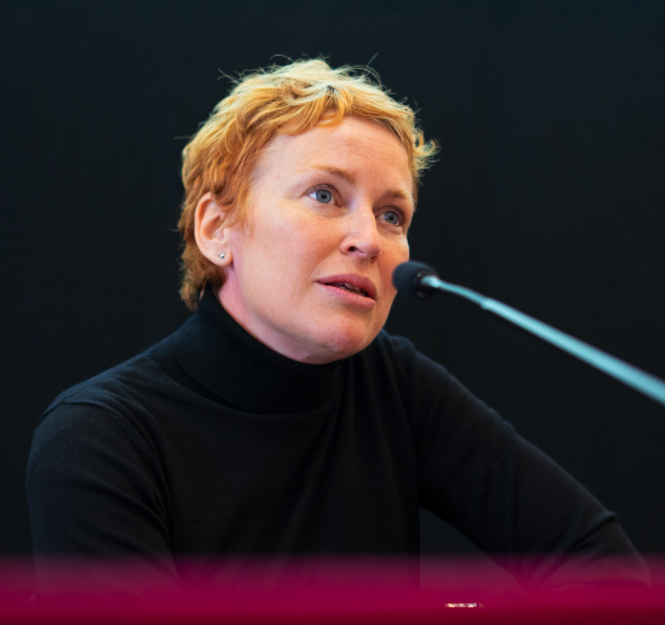
Pavla Holcová, founder of watchdog site investigace.cz, speaking at IJF25. Image: Andrea Marchi, for IJF25
“If you can hire an operations manager I think that’s very helpful,” Kotynek added. “Does it really bring value for you as editor in chief and CEO to also write the grant proposals and deal with the daily operations of the admin side? Maybe not. Maybe someone else can help you with that. Maybe even part-time, 20 hours. That would help you to be more effective on the content and leadership side.”
Holcová agreed that establishing an organizational structure, made of people who are not reporters, is also key. “Hire help as soon as you can… You need the same number of reporters as people who are running the organization,” she said. “I thought you could have 10 reporters, and two people taking care of the money [and organization]. No — it’s one to one.”
Striking the Right Work-LIfe Balance
The panelists were also asked about juggling their workload — and how they handle that burden when the weight of an organization’s success sits on their shoulders.
Félix said taking care of herself is still a work in progress.
“I haven’t found the balance. I work all day long. I’m a workaholic. And I raise twins. I don’t sleep, I’m always high on caffeine… I don’t recommend it,” she said. “Now I’m building a team. I don’t want them to think this is how to do it. You start thinking about the way you do things and it’s about setting these explicit norms.”
She recommended seeking out friends outside of journalism, whose own struggles and stresses can help you escape and put things in perspective. “Find people out of your day-to-day, so you can disconnect,” she says. “’Oh my god, he doesn’t want to eat apples. That’s so cute.’ I need that,” she laughed, recounting an anecdote about a mom friend and her child.
Kotynek learned the hard way that he needed to set some firm personal boundaries: when the fund was launched, an injury he sustained from working morning to night meant that for three months he could not move his right arm.
As a result, he did two things. First, he said: “I now have a work phone and a personal phone, and the work phone is off at the weekend. It’s a fund — what’s going to happen at the weekend? It’s not a newsroom.”
The second — scheduling sports in his calendar. “And this is an appointment — I cannot cancel it. I have to do it. It starts to help.”
Holcová also suggested turning to exercise and having people you can speak to, to avoid burnout: “I run in the morning, try to sleep a lot. I have good friends,” she added. “And when it was really unbreakable and I was burning out, I took one year off and took a fellowship.”
In these uncertain times, when it seems harder than ever to sustain pre-existing media organizations and newsrooms, the panel was asked what they would say to someone thinking of starting their own news organization. Their responses, notably, spanned the spectrum.
“Don’t do it!” said Holcová, with a smile, but conveying a sense that for many this would be a complicated time to dive in. “I don’t know. I would say: ‘Do you still want to be a journalist?’ If yes, don’t do it.”
Kotynek said people with an idea for their own organization should “do it, but do it thoughtfully. Think is there an audience? What are their needs? Is there a market for it?”
The startups that usually work, he said, are those that have done their market research, solicited user feedback, have a strategy, and know their user needs, rather than those set up by journalists “that sound great” but which produce content for which there’s a very small market.
Félix, however, delivered some optimism.
“Just do it. There’s a lot of people rooting for you. When I started Conecta Arizona… no one was betting on the thing that I did,” she explained. “More than ever, we need local journalism that is doing a good job. That doesn’t just land the national narrative in our local communities. You can be the ones setting the agenda now. That’s an act of courage right now, this year.”
 Laura Dixon is a senior editor at GIJN, based in the UK. She has reported from Colombia, the US, and Mexico, and her work has been published by The Times, The Washington Post, and The Atlantic, among others. She is a former staff reporter of The Times in London, and has received grants and fellowships from the IWMF, the Pulitzer Center, and Journalists for Transparency.
Laura Dixon is a senior editor at GIJN, based in the UK. She has reported from Colombia, the US, and Mexico, and her work has been published by The Times, The Washington Post, and The Atlantic, among others. She is a former staff reporter of The Times in London, and has received grants and fellowships from the IWMF, the Pulitzer Center, and Journalists for Transparency.


